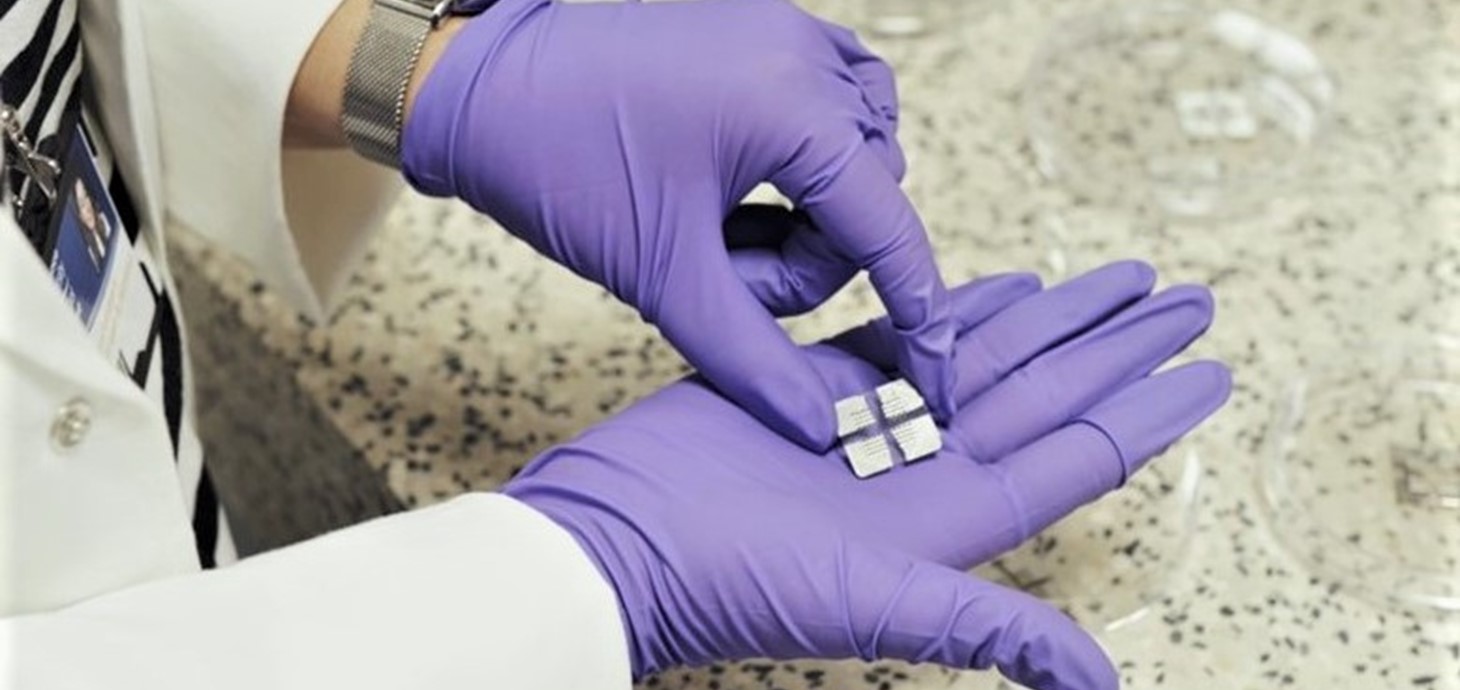
Smart patch: compared to hypodermic single needles, a ‘smart patch’ consists of a collection of tiny needles - microneedles - created to break the skin barrier in a minimally invasive manner, similar to a nicotine patch. Their innovative design means they can be developed to identify and monitor specific biomarkers in the skin.
Scientists from Swansea University ‘s Institute for Innovative Materials, Processing and Numerical Technologies (IMPACT) and Japan have been awarded £1.3 million to develop a new “point of care testing” kit that can detect biomarkers for Alzheimer's Disease.
The project follows Dr Sanjiv Sharma’s ground-breaking work in this area and the development of the world’s first COVID-19 ‘smart patch’.
Compared to hypodermic single needles, a ‘smart patch’ consists of a collection of tiny needles - microneedles - created to break the skin barrier in a minimally invasive manner, similar to a nicotine patch. Their innovative design means they can be developed to identify and monitor specific biomarkers in the skin.
This new major project will see Dr Sharma lead a consortium of leading scientists from Swansea University, Imperial College London and The University of Glasgow. Dr Kaori Tsukakoshi will steer researchers from Japan with Tokyo University of Agriculture & Technology and National Institutes for Quantum Science & Technology. Together they will create a Point-of-Care Testing Kit to facilitate early diagnosis and monitoring of disease progression in primary clinics or home settings.
Dr Sanjiv Sharma of Swansea University comments:
"Alzheimer’s Disease (AD) is the most prevalent form of dementia. It is presently untreatable and associated with a high social and familial burden, for which national health systems are not prepared, constituting a major challenge for sustainable development.
Over a million people in the UK are predicted to have dementia by 2025 and with the current cost of £26 billion a year to the UK economy, there is a huge financial and societal impact. Similarly, Japan’s aging population is witnessing an increase in AD. This increase of total prevalent AD cases in those ages 60 years and older from 3.5 million cases in 2016 to 4.9 million cases in 2026 corresponds to an annual growth rate of 4%. There are similar trends seen globally.
As disease modifying-treatments (DMT) for AD are becoming a possibility, evidence suggests any effective preventive or DMT must be started very early in the disease process, stressing the importance of an early diagnosis based on easily accessible biomarkers. Thus, the development of non-invasive markers of AD pathology in blood and skin samples is essential for screening the elderly population with memory complaints and could represent the first step to determine individuals at greatest risk of AD dementia."
Dr Kaori Tsukakoshi of Tokyo University of Agriculture and Technology comments:
“In the last decade, blood biomarkers for AD diagnosis have been extensively studied and are finally being established. Our collaborative research focusing on the development of the Point-of-Care Testing device for the AD biomarkers would facilitate a new diagnostic process of AD, which will enable more patients with AD to be led to upcoming DMT for AD.”
This is a multidisciplinary research project co-funded by the Medical Research Council – UK Research and Innovation, and the Japan Agency for Medical Research and Development (AMED).
The IMPACT operation is part-funded by the European Regional Development Fund through the Welsh Government and Swansea University
